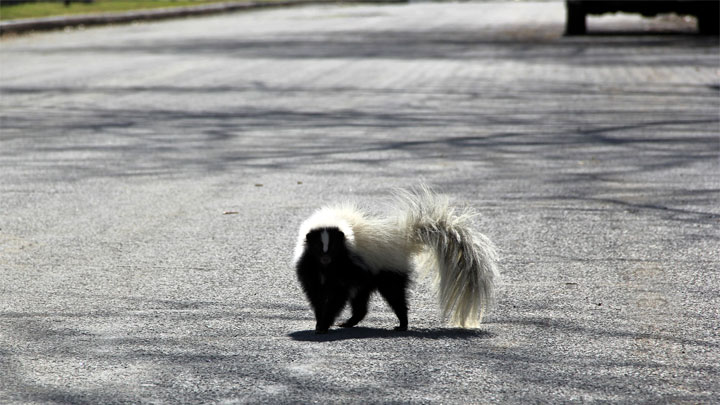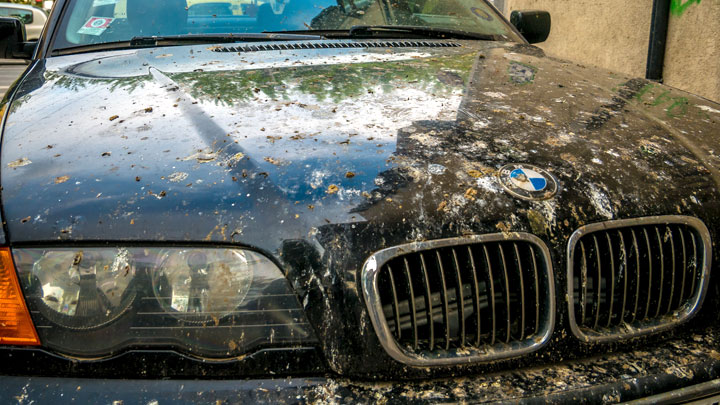Last Updated on April 14, 2022
Most people spend a fair amount of time in their vehicles, as they take vacations, commute to/from work, and run errands. Therefore, it’s only natural for one to wish for this time to be as pleasant as possible. However, few circumstances quell this notion quite as quickly as a bad smell befalling your vehicle.
Within the spectrum of unpleasant odors, few are as stomach churning as the foul musk of a skunk’s spray. The severity of this smell ranges from moderately annoying, to downright nauseating, and always proves to be quite frustrating to deal with. As most are well aware, the scent of a skunk often lingers for days, or even weeks, without dissipating.
This exact scenario leads many motorists on a desperate search for the best way to fumigate their vehicle, in a bid to eliminate lingering skunk odor. Luckily, with a little determination, and an ample dose of patience, one can certainly succeed in removing the offensive odor of a skunk’s spray from their vehicle.
Read on to learn more about how to get rid of the skunk smell from your car, as well as everything you need to know about skunk spray in general.
Why Does It Smell Like Skunk in My Car?

Throughout their lifetimes, most vehicles fall victim to many less than pleasant odors, whether it be a musty/mildew smell from your vents, a burning smell, a strong gasoline odor, or something else. Of these, few are as troublesome as that of skunk.
In reality, a vehicle can become contaminated with skunk spray in a number of ways, all of which are equally as aggravating.
Vehicles often become tainted with skunk scent when they strike a live skunk as it crosses a roadway. Skunks have poor eyesight, and often venture out into traffic without regard for the inevitable. This is especially true during nighttime travels, as skunks are primarily nocturnal in nature.
Alternatively, a vehicle can also become contaminated with a skunk smell when driving over a dead skunk in the road. When this occurs, a car’s tires often rupture a dead skunk’s scent glands, thereby coating a vehicle’s undercarriage putrid skunk spray.
In certain rare cases, a skunk will spray a parked vehicle in a driveway. Again, a skunk’s eyesight is quite poor, making it difficult for them to determine the true source of a threat. As such, a vehicle is often misinterpreted as a predator and is sprayed thoroughly at a short distance.
Why Does Skunk Spray Smell So Bad?

There is actually a scientific reason for the putrid odor that accompanies a skunk’s spray. The liquid formed within a skunk’s scent glands is a thiol, meaning that it is sulfur based in nature. As most are well aware, sulfur itself carries a strong rotten-egg type odor that is quite potent, if not nauseating.
However, skunk spray is far more concentrated than many thiol substances. This explains the pungency of skunk spray odor.
This smell is extremely strong, and far more long-lasting than many other sulfur-based odors. At times, the smell of skunk spray can become so potent, that it causes those nearby to have burning noses/eyes, and shortness of breath.
How Long Does Skunk Smell Last?
In general, if left untreated, the smell of skunk spray lasts 14-21 days or roughly 2-3 weeks. Of course, the exact longevity of this odor often differs on a case-by-case basis.
If exposed to the elements, such as wind and rain, skunk smell will likely dissipate to undetectable levels in approximately 2 weeks. However, this odor is likely to persist for a longer period, on the exterior of garage-kept vehicles that are seldom driven.
Additionally, skunk scent that is left untreated for lengthier periods of time, tends to be more difficult to remedy. On the contrary, this scent often proves far less troublesome to eliminate if treated immediately following initial exposure.
Will the Smell Go Away On Its Own?

If left untreated, the smell of skunk spray will dissipate on its own. However, it takes a significant amount of time for it to do so.
As mentioned above, the smell of skunk spray can last for as long as three weeks, before dissipating to the point of becoming undetectable to the human nose. Of course, the exact length of time that this smell lasts differs on a case-by-case basis.
Short of some sort of intervention, such as that described below, the chemical compounds found in skunk spray must become saturated with oxygen to be truly neutralized. This naturally occurs as air circulates around a given surface, which has been contaminated with skunk spray.
What to Do If Your Car Smells Like Skunk
One can go about treating their vehicle to eliminate the odor of skunk spray in one of several ways. However, the bulk of these methods is based upon the idea of neutralizing skunk odor at its molecular level.
Nonetheless, some of these methods work slightly better than others. The following are several of the best methods for getting rid of skunk spray odor.
#1 – Neutralize Exterior Odors
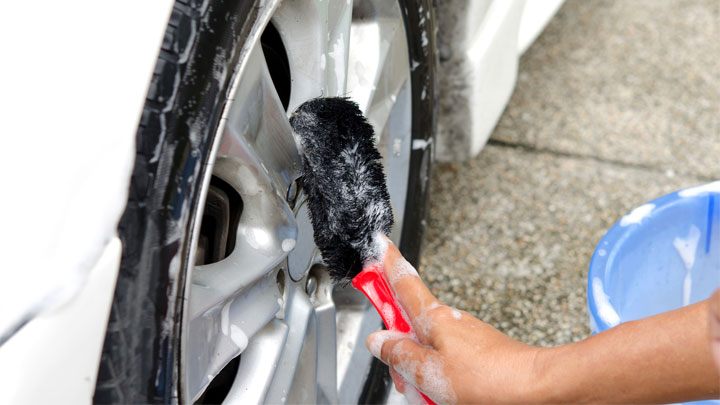
One of the most effective ways of eliminating skunk spray odor is by treating a vehicle’s exterior with a distilled vinegar/dishwashing liquid formula. Use a 1-to-1 ratio of vinegar to water and add a few drops of dishwashing liquid.
Combine this mixture in a pump sprayer or backpack sprayer (after making sure the sprayer is completely rinsed out from any lawn and garden product that may have been in there). You may also use a clean spray bottle but be prepared to have a tired trigger finger.
Liberally apply to the exterior bottom half or so of your vehicle and allow the solution to stand for approximately 5-minutes. At that time, it can be rinsed away with a garden hose.
Be sure to give special attention to a vehicle’s undercarriage and wheels when applying this treatment. For best results, scrub your wheels and tires with a wheel brush.
#2 – Freshen-Up Interior
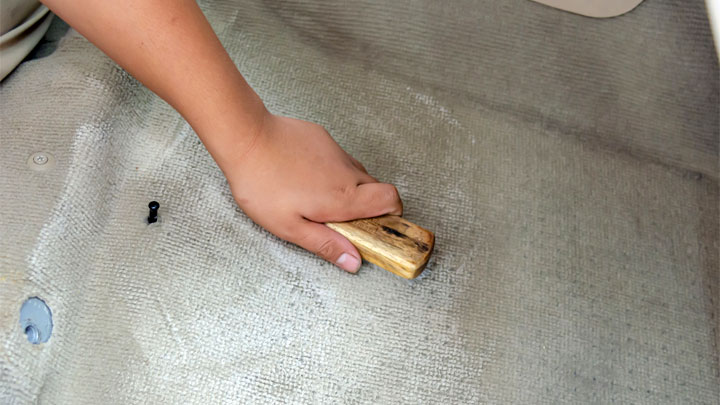
One of the most effective ways to eliminate skunk scent from a vehicle’s interior relies upon the use of hydrogen-peroxide, baby shampoo, and water mixture. This hydrogen peroxide can be mixed with water at a 1-to-5 ratio, before adding a healthy dose of baby shampoo.
Thoroughly scrub your vehicle’s carpet and upholstery using this mixture, before allowing the car’s interior to dry under direct sunlight, with all windows being rolled down.
While you’re at it, you might as well clean the inside of your windshield and other windows since the smell can attach to pretty much any surface.
#3 – Finishing Touches
After cleaning your vehicle as described above, interior air fresheners can be employed to mask any remaining odor. In many cases, any skunk odor that remains will have dissipated long before the air freshener in question begins losing its strength.
Likewise, a small container of charcoal or a box of baking soda can be placed within a vehicle’s door pocket to assist in absorbing any odors that might persist.
Will an Automatic Car Wash Get Rid of the Smell?
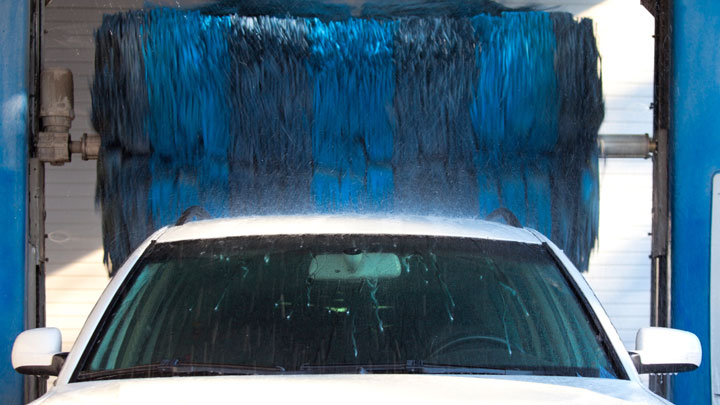
While it may sound like a good idea, it will likely only help a bit as the offending oils will remain on the vehicle surface. In addition, the car wash attendants and customers behind you may not appreciate you bringing in your car for a wash.
If at all possible, follow method #1 above in the comfort of your driveway to get the best results and least amount of glares from others.

